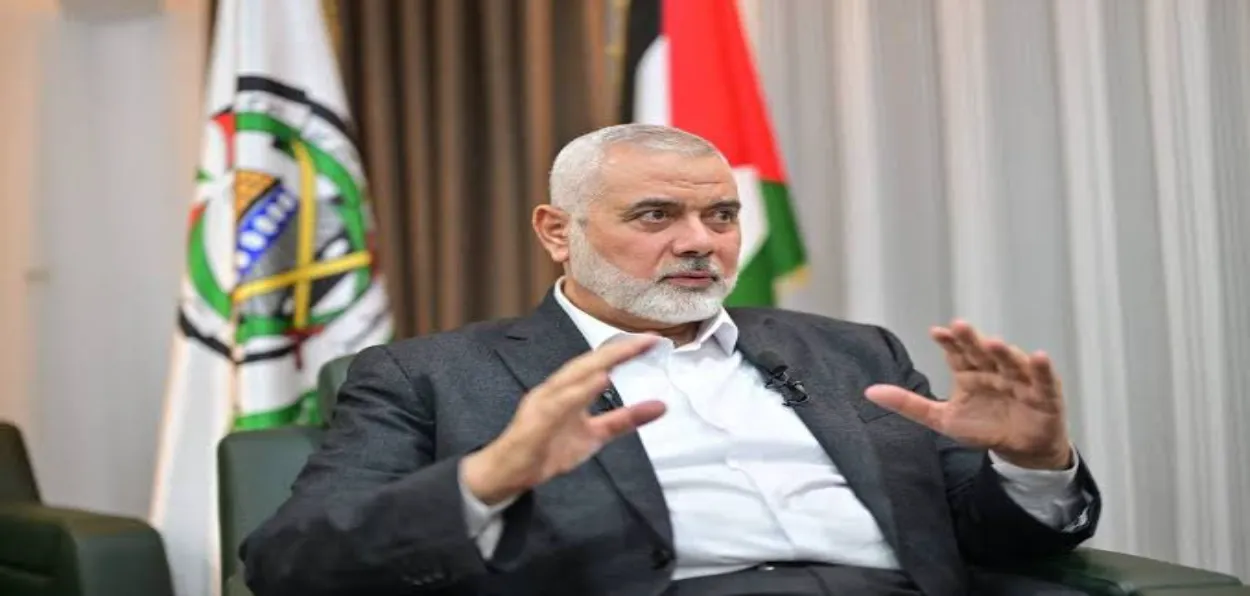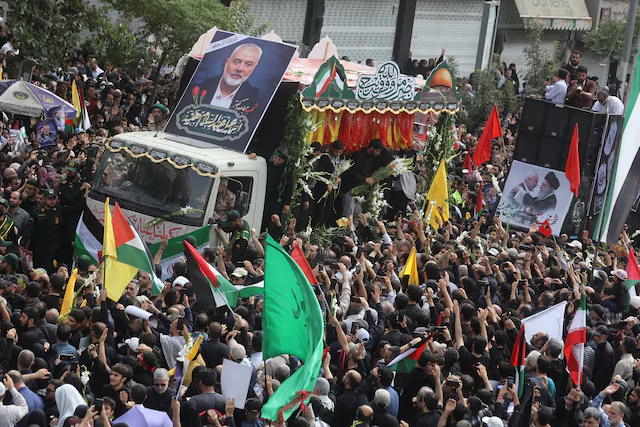
 Aditi Bhaduri
Aditi Bhaduri
The recent assassination of the Hamas leader has sent shockwaves around the world. It was not simply the assassination of a high-profile leader, but it occurred in Tehran - where Haniyeh had been living in a guesthouse provided by Iran's elite Iranian Revolutionary Guards Corps (IRGC). This proved a breach of security in Iran. While Israel has not confirmed its role in Haniyeh's assassination, both Hamas and Iran have pointed fingers at it.
After all, not only is eliminating Palestinian, including Hamas, militants a time-tested Israeli policy, but Israel has also claimed responsibility for the assassination of the top Hezbollah fighter Fu'ad Shukr in Beirut just a day preceding Haniyeh's murder, as well as that of Hamas leader Mohammad Deif.
Khaled Mashal, another veteran Hamasnik and based in Doha, is reported to be the new head of Hamas now. Hamas, Hezbollah, and Iran - patron of the former two - have vowed revenge with reports of Iran's Supreme Leader Ayatollah Ali Khamenei even calling for direct attacks on Israel. The region is on heightened alert and the negotiations ongoing for a ceasefire and release of Israeli hostages held by Hamas may be stalled.
Yet, the assassination of Haniyeh may significantly weaken Hamas, which is already weakened following 10 months of war with Israel. The increasingly brutal conflict- the latest round was launched by Hamas attacks on Israeli civilians on October 7, 2024, killing 1,200 Israelis. More than 200 civilians, including toddlers, were also taken hostage by Hamas, of whom about 111 are still in captivity, including the bodies of 39 confirmed dead. Israeli Defense Forces have also lost 339 personnel. Meanwhile 39, 000 Palestinians have died, as per the estimates of the Hamas-run Health Ministry in Gaza.
 Funeral porocession of Hamas leader Ismail Haniyeh in Doha
Funeral porocession of Hamas leader Ismail Haniyeh in Doha
To begin with, Hamas, which was designated a terrorist organization by Israel and the USA decades ago, has been a disruptive force. Not agreeing to the Oslo Accords, which it saw as a sell-out by Fatah, the violence they unleashed has done much to sabotage the accords making Palestinian statehood elusive. In the course of their existence, they have been chased out of Jordan, and Syria, and landed in Qatar, which is today their main sponsor. Iran remains their main military backer. Haniyeh was in Tehran to attend the swearing-in ceremony of New Iranian President Masoud Pezeshkian.
While Hamas has emerged stronger after every round of conflict with Israel, the group’s popularity has not kept pace with its physical might. The organization seized power in the Gaza Strip in 2007 after a violent clash with the Palestinian Authority. While they do have pockets of support in the West Bank, it was only as an alternative to the Palestinian Authority which was increasingly perceived as corrupt and inept.
Every round of violence with Israel has brought increasing death and devastation to Gaza’s people. Just how popular they are can be gauged from the fact that from time to time they are forced to reconcile and forge national unity with other Palestinian factions.
The latest round of talks and reconciliation took place in China where Hamas along with other Palestinian factions promised to work under the umbrella of the Palestinian Liberation Organization, which would act as the sole representative of the Palestinian people.
Even the 7th October attacks it launched on Israel are thought to be in many ways, to shore up its support amongst the Palestinians. While support for Hamas did increase in the immediate aftermath of the attacks, then a poll in Gaza and the West Bank in March 2024 found that support for the organization had dipped.
Moreover, if the objective of the attacks was also to galvanise the Arab and Muslim world into a war or boycott of Israel then that has not happened either.
A scene of devastation from Gaza, Palestine
From the time of the Arab Spring, the Gulf countries in particular, except for Qatar, began winding down their support for Hamas – as they saw it as an extension of the abhorred Muslim Brotherhood. Hamas had as its sponsor and patron Iran, which is the longtime traditional rival of the Sunni stateside the Middle East, and then Qatar, whom those like Saudi Arabia, UAE, and Egypt blamed for spreading terror and patronizing violent Islamist groups.
In fact, at the very beginning of the latest round of violence, Saudi Prince Turki al-Faisal had said that the actions of Hamas went against Islam, alleging that the organization was a problem for peace.
More recently, the UAE, which became the first Gulf state to establish diplomatic ties with Israel, has proposed a temporary international mission for Gaza after a ceasefire is achieved. This would lay the groundwork for government and pave the way to "reuniting Gaza and the occupied West Bank under a single, legitimate Palestinian Authority," wrote Lana Nusseibeh, UAE Assistant Minister for Political Affairs at the Ministry of Foreign Affairs, in an Oped piece in Financial Times.
The proposal has no place for Hamas in post-war Gaza and is sure to have the endorsement of other regional heavyweights like Saudi Arabia.
This effectively means that Hamas has forfeited any future help or support from these countries. While Qatar is the major patron, Hamas's actions have spotlighted the former's role in enabling and empowering the group, and this may be a foil to continuing Qatari support for Hamas.
Iran and Turkiye, who see Hamas as a legitimate force, do not have the wherewithal to support and empower it in a way to be the alternative to the Fatah. And a point to note is that Hezbollah, Iran's other major proxy in the region, with far greater capabilities than Hamas, has not opened a second front with Israel in the way that Hamas would have wanted.
While the Biden Administration publicly supports an end to Hamas rule in Gaza, so does much of the international community.
Indian humanitarian aid for the people of Gaza being handed over to officials in Egypt
However, besides, dwindling support and future aid, Hamas has also suffered enormous losses in men, weapons, and resources during the last 10 months. According to US estimates Hamas may now have only 9000 strong manpower. Their infrastructure is battered. The Israeli assault on Rafah, which was the last stronghold of Hamas after the current round of hostilities began, has further degraded Hamas' capabilities. With the loss of its many leaders one after the other, something that will take long to replace, the continuing violence, the group is in disarray.
Furthermore, the massive destruction and displacement of humans that Israel has wreaked there will take years of reconstruction and rehabilitation with enormous resources mobilised from the international community. No state that engages in the post-war reconstruction of Gaza would want Hamas back in power there.
And the war may continue: on Thursday Netanyahu said that "Israel is very prepared for any scenario - both defensively and offensively." It may, therefore, be quite possible that Israeli Prime Minister Benjamin Netanyahu may succeed, albeit at a heavy cost for Israel, to destroy Hamas.
ALSO READ: Asserting Hindu identity doesn’t always mean being anti-Muslims: Hilal Ahmed
However, an entire generation of orphans will be growing up, filled with hatred and a desire for revenge. The only antidote to end decisively the spiraling hate and violence is to begin with a ceasefire and then work towards finally establishing the two-state solutions.
